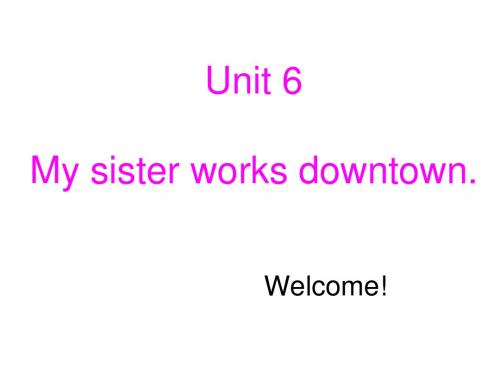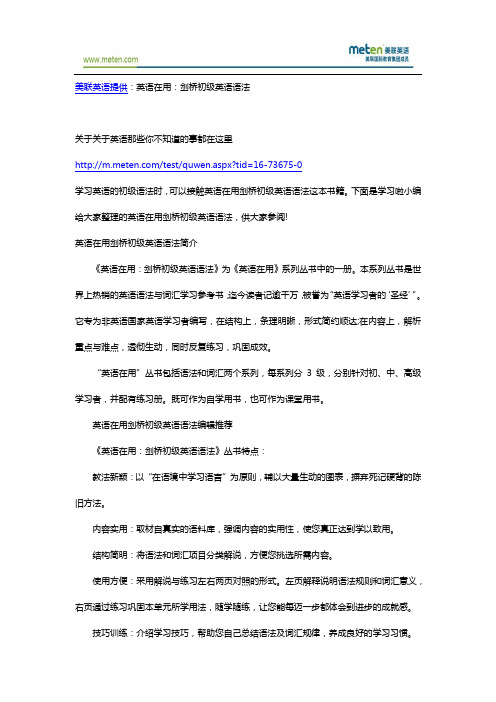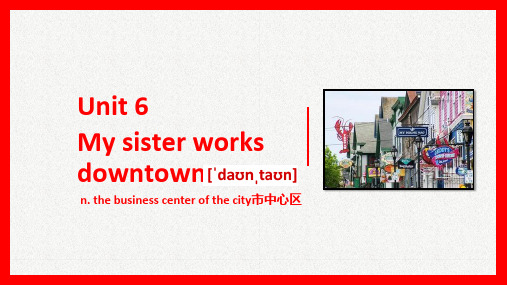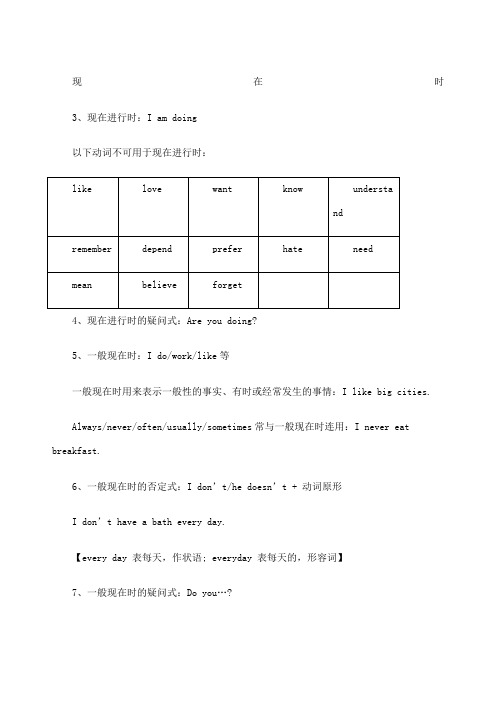剑桥初级英语语法讲义 6 (1)
剑桥英语基础A 第6课适合初学者

• 5. It is just like a bird. It can fly in the sky. • (plane) • 6. It’s very long. It goes more quickly than car. • (train) • 7. It is like a train but goes under the ground. • (underground)
5 Pronunciation
1. [p] 以下清辅音之后 发 [t] [k] [f] [θ] s=/s/ [tr] [ts]
[h]
2. 以下特殊辅音之后 发 s=/Iz/ [s] [z] [ʃ] [ʒ] [tʃ] [dʒ]
3. 其余辅音之后 发 s=/z/
I get up at noon.
一般现在时 特殊疑问句
特殊疑问词 + 一般疑问句 1、 I get up at 10:00. what time do I get up ? 2、he eats lunch at home . where does he eat lunch ? 3.They drive to work every day . when do they drive to work ?
㈠ 用所给词的正确形式填空。
• 1. • 2. • 3. • 4. We often ______ (play) in the playground. He _____(get) up at six o’clock. __ you ____(brush) your teeth every morning? What (do) he usually (do) after school? He usually (do) (he) homework. • 5. Danny (study) English and Art at school. • 7. At eight at night, she _(watch) TV with her parents. • 8. ____ Mike ______(read) English every day? • 9. How many lessons __ your classmate ___ (have) on Monday? • 10、What time _____ his mother_____ (do) the hou sework?
剑桥初级英语语法讲义 6 (5)

UNIT 11 一般过去时一般过去时态:表示过去某一时间所发生的动作或存在的状态。
谓语动词要用一般过去式。
经常与yesterday(昨天), last week(上周), last month(上个月), last year(去年), two months ago(两个月前), the day before yesterday(前天),in 1990 (在1990年), in those days (在那些日子里)等表示过去的时间状语连用。
如:I was born in 1990. (我出生在1990年)。
When did you go to the park? (你是什么时候去的公园)。
I went to the park last week. (我是上周去的公园)在上面的句子中第一句属于be动词的一般过去时态;第二句和第三句属于实义动词的一般过去时态。
1.Be 动词的一般过去时态在没有实义动词的句子中使用be动词,am is 的过去式为was; are的过去式为were.构成:肯定句:主语+was (were) +宾语如:I was late yesterday. (昨天我迟到了。
)否定句:主语+was (were) +not+宾语如:We weren't late yesterday. (我们昨天没迟到)疑问句:Was (Were) +主语+宾语如:Were you ill yesterday? (你昨天病了吗?)肯定回答:Yes, I was. (是的,我病了。
)否定句:No, I wasn't. (不,我没病。
)特殊疑问句:特殊疑问词+was (were) +主语+宾语如:When were you born? 你是什么时候出生的?2.实义动词的一般过去时态肯定句要使用动词的过去式,否定句和疑问句要使用助动词do和does 的过去式did.肯定句为:主语+动词过去式+宾语如:I went home at nine o'clock yesterday.(我昨天九点钟回的家。
剑桥初级英语语法

剑桥初级英语语法剑桥初级英语语法:内容简介:《剑桥英语语法》易于使用:书中一面是语法讲解、相对的一面是讲解过的语法内容的练习。
书后的附加练习提供了更多的练习题。
用深入浅出的语言讲解了中级英语水平学生常见的语法内容。
为自学设计:在学习指导的帮助下,学生可以选择学习他们认为有困难的语法内容。
目录和索引帮助学生很容易找到他们学习的每一单元内容。
书后附有所有练习答案。
书评:《剑桥英语语法》包括36个单元,每个单元重点讲解一个语法项目。
有些较难的语法项目需要2个或更多的单元。
每单元的详细内容请参见目录。
每单元的内容分布在相对应的两页上,左边一页是语法项目的讲解,右边是练习。
书后附有练习答案。
书后还有7个附录,详细讲述了不规则动词、动词的各种形式、拼写法及美国英语等。
目录:现在时与过去时:1 现在进行时(I am doing)2.一般现在时(I do)3.现在进行时与一般现在时(1)(I am doing与I do)4.现在进行时与一般现在时(2)(I am doing与I do)5.一般过去时(I did)6.过去进行时(I was doing)现在完成时与过去完成时:7.现在完成时(1)(I have done)8.现在完成时(2)(I have done)9.现在完成进行时(I have been doing)10.现在完成进行时与现在完成时(I have been doing 与I have done)11.How long have you (been)12.When...?与How long...? For 与since13.现在完成时与一般过去时(1)(I have done 与I did)14.现在完成时与一般过去时(2)(I have done 与I did)15.过去完成时(I had done)16.过去完成进行时(I had been doing)17.Have 与have goted to (do)将来时:19.现在时(I am doing/I do)表示将来20.(I’m) going to (do)21.Will/shall(1)22.Will/shall(2)23.I will 与I’m going to24.Will be doing 与will have done25.When I do/When I’ve done When 与if剑桥英语语法易错点考前梳理(一):主动结构表被动:(1) open,lock,write,read,sell,wash,cut,burn,drive等词作不及物动词时,它们的主语为物,可以用主动语态表被动意义。
剑桥语法知识点总结

剑桥语法知识点总结剑桥语法知识点是英语学习中非常重要的一部分,掌握好剑桥语法知识点对提高英语水平非常有帮助。
在考试中,如果能掌握好剑桥语法知识点,可以帮助我们更好地理解和使用英语,提高我们的得分。
下面是一些剑桥语法知识点的总结。
一、主谓一致主谓一致是指主语和谓语在人称和数上保持一致。
在英语的基本句型中,主语和谓语的一致性是非常重要的,否则句子就会出现语法错误。
1. 单数主语与单数谓语例如:The cat is sleeping.2. 复数主语与复数谓语例如:The cats are sleeping.3. 特殊情况(集体名词、不可数名词、单数形式)例如:The team is winning.例如:The water is boiling.例如:The news is good.二、动词时态动词时态表示动作或者状态发生的时间,包括一般现在时、一般过去时、一般将来时、现在进行时、过去进行时、将来进行时、现在完成时、过去完成时、将来完成时等。
掌握好动词时态的用法,可以帮助我们正确地表达出我们的意思。
1. 一般现在时表示现在进行的动作或者状态,一般现在时用于表示经常性的动作或常态。
例如:I play football every day.2. 一般过去时表示过去发生的动作或者状态,一般过去时用于某个过去的时间。
例如:I played football yesterday.3. 一般将来时表示将来要发生的动作或者状态,一般将来时用于表示将来的某个时间。
例如:I will play football tomorrow.4. 现在进行时表示现在正在进行的动作,现在进行时用于表示现在正在进行的动作。
例如:I am playing football now.5. 过去进行时表示过去正在进行的动作,过去进行时用于表示过去某个时间正在进行的动作。
例如:I was playing football when it started raining.6. 将来进行时表示将来某个时间正在进行的动作,将来进行时用于表示将来某个时间正在进行的动作。
英语在用:剑桥初级英语语法

美联英语提供:英语在用:剑桥初级英语语法关于关于英语那些你不知道的事都在这里/test/quwen.aspx?tid=16-73675-0学习英语的初级语法时,可以接触英语在用剑桥初级英语语法这本书籍。
下面是学习啦小编给大家整理的英语在用剑桥初级英语语法,供大家参阅!英语在用剑桥初级英语语法简介《英语在用:剑桥初级英语语法》为《英语在用》系列丛书中的一册。
本系列丛书是世界上热销的英语语法与词汇学习参考书,迄今读者记逾千万,被誉为“英语学习者的‘圣经’”。
它专为非英语国家英语学习者编写,在结构上,条理明晰,形式简约顺达;在内容上,解析重点与难点,透彻生动,同时反复练习,巩固成效。
“英语在用”丛书包括语法和词汇两个系列,每系列分3级,分别针对初、中、高级学习者,并配有练习册。
既可作为自学用书,也可作为课堂用书。
英语在用剑桥初级英语语法编辑推荐《英语在用:剑桥初级英语语法》丛书特点:教法新颖:以“在语境中学习语言”为原则,辅以大量生动的图表,摒弃死记硬背的陈旧方法。
内容实用:取材自真实的语料库,强调内容的实用性,使您真正达到学以致用。
结构简明:将语法和词汇项目分类解说,方便您挑选所需内容。
使用方便:采用解说与练习左右两页对照的形式。
左页解释说明语法规则和词汇意义,右页通过练习巩固本单元所学用法,随学随练,让您能每迈一步都体会到进步的成就感。
技巧训练:介绍学习技巧,帮助您自己总结语法及词汇规律,养成良好的学习习惯。
参考答案:详尽全面,给您充分的信息。
英语在用剑桥初级英语语法目录To the studentTo the teacherThanksUnit1 am/is/are2 am/is/are(questions)3 I am doing(present continuous)4 are you doing?(present continuous questions)5 I do /work/llike etc.(present simple)6 I dont…(present simple negative)7 Do you…?(presnt simple questions)8 I am doing and I do(present continuous and present simple)9 I have…/Ive got…10 was/were11 worked/got/went etc.(past simple)12 I didnt…Did you…?(past simple negative and questions)13 I was doing(past continuous)14 I was doing(past continuous)and I did (past simple)15 I have done(present perfect 1)16 Ive just... Ive already... I havens...yet(present perfect 2)17 Have you ever....?(present perfect 3)18 How long have you...?(present perfect 4)19 for since ago20 I have done(present perfect)and I did (past simple)21 is done was done(passive 1)22 is being done has been done(passive 2)23 be/have/do in present and past tenses24 Regular and irregular verbs25 I used to...26 What are you doing tomorrow?27 Im going to ...28 will/shall(1)29 will/shall(2)30 might31 can and could32 must mustnt neednt33 should34 I have to...35 Would you like...? Id like36 there is there are37 there was/were there has/have been there sill be38 It...39 I am I dont etc.40 Have you? Are you? Dou t you? etc.。
剑桥国际英语教程(入门级)6单元全

I don't live far from here. You don't live near here. He doesn't work downtown. She doesn't drive to work. We don't live alone. They don't need a car.
Grammar Focus 一般疑问句 特殊疑问句
Do you get up early ? No, I get up late. Does he have lunch at noon ? No, he eats lunch at 1:00. Do they drive to work ? Yes, they drive to work every day . What time do you get up? What time does he have lunch? When do they drive to work ? At ten o'clock. At ten o'clock. Every day.
第三人称单数变化规则
(1) 直接在动词后加-s。 eat-eats,write - writes,dance-dances (2) 以s,x,ch,sh,o 结尾的词加-es teach - teaches,watch-watches,guess - guesses go-goes, do-does (3) 以辅音字母+y结尾的词变y为i再加-es try - tries,study-studies have-has
• • • • • • • •
开车 步行 坐公交 坐地铁 坐火车 骑自行车 骑摩托 打出租车
Convesation Ashley: Nice car, Jason! Is it yours ? Jason: No, it's my sister's. She has a new job, and she drives to work. Ashley: Is her job here in the suburbs? Jason: No, it's downtown. Ashley: My parents work downtown , but they don't drive to work. They use public transportation. Jason: The bus or the train ? Ashley: The train doesn't stop near our house, so they take the bus. It's really slow. Jason: That's too bad.
剑桥少儿英语 Kid‘s Box1 6单元复习

MADE BY AMBER
5
( ) 1. A. grey B. bread C. green D. grass
( ) 2. A. brush B. fresh C. fry
D. Friday
( ) 3. A. bread B. bride C. ride
D. brother
( ) 4. A. bed B. bad C. dog
安静一点 be quiet
一个黄色 的包
一支黄色 的铅笔
a yellow bag
a yellow pencil
给猫刷毛
一条棕色 的狗
一条粉色 的鱼
一个橘色 的球
brush my cat
给马洗澡
wash my horse
a brown dog
一辆红色 的自行车
a red bike
a pink fish
一般疑问句:Have you got a new pen? 你有一支新笔吗?(一般疑问句,一人 称变二人称) 肯定回答:Yes, I / we have. 否定回答:No, I / we haven’t.
2. I taste with my mouth. 我用嘴来品尝。 I see with my eyes. 我用眼睛来看。 I hear with my ears. 我用耳朵来听。 I smell with my nose. 我用鼻子闻。 I touch with my hands. 我用手来触摸。
KB1单元复习资料
U6 My face
单词
嘴巴
mouth
鼻子
nose
耳朵
ear
头发
hair
眼睛
eye
脸
face
剑桥语法精讲

剑桥语法精讲1. 什么是剑桥语法?剑桥语法是指英语中的一种语法体系,被广泛应用于剑桥英语考试中。
剑桥语法包括了英语的基本语法规则、常见的句型结构、动词时态和语态的运用等内容。
了解和掌握剑桥语法对于学习英语、提高英语水平和应对剑桥英语考试都非常重要。
2. 剑桥语法的基本语法规则剑桥语法主要包括了句子的主谓宾结构、名词性从句、定语从句、状语从句等基本语法规则。
下面是剑桥语法的一些基本要点:2.1 主谓宾结构剑桥语法要求句子应该具有明确的主谓宾结构,即句子中必须包含有主语、谓语和宾语。
主语一般位于句子的主位,谓语紧跟在主语之后,宾语一般位于谓语之后。
2.2 名词性从句名词性从句在句子中充当名词的角色。
剑桥语法中常见的名词性从句包括宾语从句、主语从句和表语从句。
名词性从句一般由连接词引导,如that, if, whether等。
2.3 定语从句定语从句用来修饰一个名词。
剑桥语法要求定语从句应该紧跟在被修饰的名词之后,用关系代词或关系副词引导。
常见的关系代词包括who, whom, whose, which,that等。
2.4 状语从句状语从句用来表示时间、原因、条件、目的等信息。
剑桥语法要求状语从句应该位于句子的前面或后面,用连接词引导。
常见的连接词包括when, while, because, if, unless等。
3. 剑桥语法句型结构剑桥语法中有许多常见的句型结构,掌握这些句型结构对于理解句子的意思、准确运用语法非常重要。
以下是几种常见的剑桥语法句型结构:3.1 基本句型结构英语中最基本的句型结构是SVO结构,即主语+谓语+宾语。
这是剑桥语法中最常见的句型结构,也是最基础的句型结构。
3.2 倒装句型结构剑桥语法中有一些特殊情况下需要使用倒装句型结构。
常见的情况包括将助动词或情态动词移到主语之前、将否定词移到主语之前以及将表示方向的副词移到谓语之前等。
3.3 强调句型结构强调句型结构用来强调句子中的某个成分。
雅思剑桥6听力S1+解析

剑桥雅思6听力Section 1SECTION 1 Questions 1-10Questions 1-4Complete the notes below.Write NO MORE THAN THREE WORDS for each answer.Notes on sports clubExample AnswerName of club: KingswellFacilities available: Golf1.......................2.......................Classes available: •Kick-boxing 3.......................Additional facility: 4....................... (restaurant opening soon) Questions 5-8Complete the table below.Write NO MORE THAN TWO NUMBERS for each answer.Questions 9 and 10Complete the sentences below.Write ONE WORD ONLY for each answer.9 To join the centre, you need to book an instructor's ................... .10 To book a trial session, speak to David....................(0458 95311).1.They've got a lot of facilities we don't have and vice versa.他们有很多我们这里没有的设备,反之亦然。
Vice versa在这里的意思是“我们也有很多他们没有的设备”。
剑桥国际英语入门级unit6 my sister works downtown

一般现在时 是指表示经常性、习惯性的事件、客观事实、客观规律、自
然现象的一种时间状态。
1.I walk to school. 我走路去学校。 2.He eats breakfast at 7 A.M everyday. 他每天7点吃早餐。 3.The sky is blue(自然现象)天空是蓝的。 4.We are students.我们是学生。
to work by car. My little sister is a cute baby. She can sing and
dance. We like sports and we often run in the morning .What about
you?
Simple present tense 一般现在时 There are four people in my family. They are my father,mother, sister and I.
Simple present tense 一般现在时
句型结构
否定句
第一,找时间状语,判断时态; 第二,找人称,决定借哪个助动词do/ does; 第三,助动词后,动词用原形; 第四,some/many变any
Simple present tense 一般现在时
句型结构
Do 和 Does 放在句首 Do you walk to school?
boat helicopter (直升飞机) jeep (吉普车) van(小货车) truck (货车) motorcycle(摩托车) tank (坦克)
交通工具
tɒp
• Helicopter:[ˈhelɪkɒptə(r)]
直升飞机
Snapshot
雅思剑桥6听力text1 word版.

TEST 4SECTION 1K:Conference Centre Reservations. Good morning.N:Hi. I'm interested in the computing conference next month.K:Future Directions(Example) in Computing?N:Yes, that's right. Could I ask you a few questions about it?K:Of course.N:OK. I know the conference is for three days but actually I want to attend on the Friday and Saturday only. Will that work out to be any cheaper?K:Let me have a look. Well, you could register for the two days separately, but that wouldn't actually save you very much as it still costs £35 for each day. In fact, if you could register for the three days, you also get an invitation to a free dinner on the Saturday night, so that's probably the better option.N:Right, I'll do that. How much will the fees be in that ease?K:It's £75(Q1).N:All right. I'd like to register for the full three days. Now, can I pay that by credit card?K:I'm afraid not. You'll have to send a cheque(Q2) to us, or you can pay at the conference office. N:Fine. So it's probably easiest if I pay by cheque. Now then, what else do I need to arrange? Right. How about accommodation? I guess that's not included in the price?K:No, I'm sorry, it's not, but we do have a few rooms available for delegates at the conference centre if you'd like. Those are very cheap but if you're interested you'll need to book soon, because there's always a heavy demand for them. They are only £15(Q3) per night, but they are very basic and you'd have to get your own breakfast, because they don't provide you withthat. But it's very convenient, because it's in the same building as the conference rooms.N:Uhuh.K:Or there's a very reasonable guest house which is £25(Q4) per night. And I think that includes your breakfast.N:Is it close to the conference centre?K:It would be about a ten-minute walk away from here(Q5).N:I see. That sounds quite reasonable.K:The details are all in our conference pack(Q6). which I'll send you.N:Great, thanks That'll he very useful. Oh, and can you also send me an application form?K:Of course. I'll get that in the post to you straight away. Is there anything else?N:Yes, actually. Can you tell me where exactly the conference centre is?K:Well, it's on South(Q7) Park Road and it's right at the end of the road next to the library(Q8). It's a ten-minute taxi ride from the station and will cost you £5(Q9). Otherwise, you can take the bus which runs every half an hour from the station - that's the 21A(Q10) - and it brings you straight to the conference centre.N:Right, got that.SECTION 2Good morning and welcome, everybody. I'm Jenny Stewart and I'm the Staff Manager hereat the exhibition centre. We're expecting this year's International Travel Exhibition to attract over 10,000 visitors a day, ladies and gentlemen, and you are among the two hundred extrastaff recruited to help look after them. Now, to help things run smoothly, we have dividedyou into four teams - the blue team, the green team, the red team, and the yellow team. Sofirst I'll explain how the teams are divided up, and then we'll be giving you colour-codedT-shirts so we can identify you more easily. First of all, those who will be looking after the phones and handling all calls regarding the exhibition, you will be on the red team. Now,we've also out the entrance staff on the red team and you'll be stamping the entrance tickets(Q11) and giving out publicity leaflets, OK?Those of you involved in distributing entrance tickets will be on the yellow team and we'vealso put those of you who'll be staffing the information booths around the conferencecentre on the yellow team, so you'll be getting a yellow T-shirt. Now, most of the hospitality staff have been put in the blue team, so the chefs among you and the kitchen hands willall need a blue T-shirt(Q12). but, because of the sheer numbers, all waiting staff will be on the yellow team, and this includes the bar staff among you. Those who will be monitoring and directing the traffic in the car parks are on the green team. (Q13) so you'll need to get a greenT-shirt. This year we've also employed a considerable number of attendants to direct the human traffic around the conference centre. Now, you'll be working in the exhibition hallat all times, giving directions and generally helping people whenever you can. and you willbe in the red team, so please collect a red T-shirt.Right, now that everyone knows what team they're in, we'll get on with the orientation and training programme and first I'll run through the rest of today's programme, which you should have in front of you, so that you can get a general idea of what else is in store today. This introduction finishes at 9.30 and then you'll be hearing from Anne Smith. Anne worksin the accounts department on level two and she looks after all temporary staff, and soshe is the person to see if you have any problems regarding pay. Anne will be explaining when and how you get this. She will also be handing out your tax(Q14) forms. And I will just stress that all tax forms must be completed and returned to Anne before your pay can be processed. Following Anne's talk you'll hear from Peter Chen, our Conference Manager,and he will be going over a plan of the conference centre with you, which will help you to orient yourselves. He will also go through the security(Q15) arrangements with you and show you the fire exits. Then at 10.30, there will be a coffee break in the staff canteen, which is located down on the ground floor(Q16). Now, after the break we'll be moving to a different location for a video presentation, so instead of coming back here, we'd like you all to goto Lecture Room three-one-one(Q17). You'll find it on this same level, just down the hall and there you will be shown a video about important safety issues in the workplace, called Safety at Work(Q18). We'll finish off the morning with lunch, which should give everyone a chance to meet and get to know each other, and we'll be serving you a buffet lunch inthe Main Hall(Q19). which is on the first floor, from 12.00 o'clock. After lunch you'll be divided up into your teams to meet your team leaders(Q20) and we're hoping to be all finished by 3.00 so I won't delay you any longer, and I'll hand over to...SECTION 3N:Good afternoon. Can 1 help you?T:Good afternoon. Yes, I've just transferred to the School of Education, and I'd like information about joining the library.N:Well, the School of Education has libraries on two sites, as I'm sure you know. This one here is the Fordham Site, and the other is on Castle Road.T:And is there any difference between the two libraries?N:Not in terms of their facilities Access to online databases and the Internet is available at both sites and each site has a range of reference(Q21) materials on education.T:Oh yes. I see.N:But the Castle Road site has books on the sociology of education and a collection of textbooks(Q22) and teaching resources covering most of the subjects taught in secondary(Q23) schools.T:Ah, right, but I'm training to be a primary teacher so I need to look at materials for the five to eleven age group.N:Then you've come to the right place. At Fordham we hold material relating to primary(Q24) education, as well as special needs, but of course you'll need to familiarise yourself with both sites to make the most of our resourcesT:You haven't mentioned periodicals. Are they held at both sites?N:Current issues, yes but if you want to look at back(Q25) issues you'll need to use the CD-ROM databases which are held here at Fordham.T:I see. Now, about borrowing books. I'm living out of town, so I'm hoping I can borrow quite a few items, and cut down on the number of trips I have to make.N: Right, well, members can borrow two books at a time from each site.T:Only two books?N:Only two from each site, hut that's four altogether.T:Oh I see, and how long can I hang on to them for?N:The borrowing period is one month, but of course books can be renewed. You can renew any item a maximum of three times.T: Do I have to come to the library to do that?N:No, you can do it by telephone or email, but you can't renew overdue(Q26) books this way, only before or on the due date stamped in the hook. We'll need your full name, your borrower number and the name of the site library you borrowed the items from.T:So theoretically I can borrow books for up to three months - is that what you're saying?N: yes, provided they're not recalled.T:So, what happens then?N:Well, sometimes an item is requested by another borrower, in which case we'd send you a letter, and you'd have to return the book within seven working days(Q27). Don't forget we're closed on Sundays.T:OK.T:I expect it'll take me a while to find what I need. There's such a lot here.N:Yes there is, but if you need help getting started, this term we're running three study skills workshops.T:Oh? What are they on?N:Er, let me see. The first one's on resources - yes, here it is. How to use the library's resources.That includes everything, not just the print and technical resources. (Q28/29/30)T:That sounds useful, Is there anything on using the Internet?N:Er, let's see. The one on the Internet for beginners was last term. This term it's finding research materials online(Q28/29/30).T:That sounds interesting too, hm, what's the last one?N:It's a worksbop on dissertations(Q28/29/30).T:What do you mean - how to write one?N:Er, no it's more to do with academic writing conventions, you know - writing a bibliography and how to refer to sources in your text. That sort of thing. Anyway, here's a leaflet with information about all three.T:Thanks a lot. That'll be very useful.N:You're welcome.SECTION 4Well, most people think that lions only come from Africa. And you would be forgiven for thinking this, because in fact most lions do come from Africa. But this hasn't always beenthe case. If we go back ten thousand years we would find that there were lions roamingvast sections of the globe. But now, unfortunately, only very small sections of the lions'former habitat remain.My particular interest is Asiatic lions, which are a sub-species of African lions. It's almosta hundred thousand years since the Asiatic lions split off and developed as a sub-species. (Q31) At one time the Asiatic lion was living as far west as Greece and they were found from there, in a band that spread east through various countries of the Middle East, all the way toIndia. In museums, you can now see Greek coins that have clear images of the Asiaticlion on them(Q32). Most of them are dated at around 500 B.C. However, Europe saw its last Asiatic lion roaming free two thousand years ago(Q33). Over the next nineteen hundred years the numbers of Asiatic lions in the other areas declined steadily, but it was only inthe nineteenth century that they disappeared from everywhere but India.So, how can you tell an Asiatic lion from an African lion, with which you're probably more familiar? Well, in general, Asiatic lions are not as big as African lions The colour is moreor less the same, but the appearance of the mane is different - that's the hair around thelion's face and neck. The Asiatic lion's mane is noticeably shorter than the African lion's Asiatic lions also have a long fold of skin on their undersides, whereas not manyAfrican lions have this(Q34).Well, I'd like to talk to you now about the Gir Sanctuary in India. That's where I've justcome back from. The sanctuary was established specifically to protect the Asiatic lion.It's 1,450(Q35) square kilometres in area and most of it is forest. There are now aroundthree hundred Asiatic lions in India and almost all of them are in thissanctuary.But despite living in a sanctuary, which makes them safe from hunters, they still face a number of problems that threaten their survival. One of these is the ever-present dangerof disease(Q36). This is what killed more than a third of Africa's Serengeti lions in 1994, and people are fearful that something similar could happen in the Gir Sanctuary and kill off many of the Asiatic lions there.India's lions are particularly vulnerable because they have a limited gene pool. The reasonfor this is interesting- it's because all of them are descended from a few dozen lions that were saved by a prince(Q37) who took a particular interest in them. He was very wealthy, and he managed to protect them otherwise they'd probably have died out completely.When you see the Asiatic lion in India, what you sense is enormous vitality. They're very impressive beasts and you would never guess that they had this vulnerability when youlook at them.The Asiatic lions don't have the Gir Sanctuary to themselves, I should add. They actually share it with about two thousand farmers. A significant proportion of the lions' diet(Q38) is made up of the livestock of these farmers - goats, chickens and so on - as much as a third,in fact. And they've even been known to attack humans(Q39), especially in times of drought. One final piece of interesting information - in ancient India one of the greatest tests of leadership(Q40) for a man was to fight a lion. Now it seems, in modern India it will be a great test to see if the lion can be saved, I'm sure this is something that all of you will share concern for too.。
新编剑桥商务英语初级 Module 6

Hotel amenities 宾馆便利设施
a fitness room/ gym 健身房 translation services 翻译服务 laundry service 洗衣服务
Types of Hotels 宾馆的种类
(5、4、3、2、1) star hotel/ luxurious hotel 星级/ 豪华宾馆 business hotel 商务酒店 inn 小旅馆 motel 汽车旅馆 hostel 招待所,学生公寓
6.1 Business travel 商务旅行
Focus 学习重点
熟悉与商务旅行相关的词汇 学会谈论商务旅行的相关话题 练习在听力和阅读过程中寻找具体信息 掌握间接引语的用法
Listening: Flight problems 航班问题
Vocabulary on flight aircraft n. 飞机 check-in 办理登机手续 delay v. 飞机晚点 journey n. 旅程 land v. 降落 luggage n. 行李 passenger n. 乘客 passport n. 护照
Listening: Flight problems 航班问题
Speaking: Process of boarding Describe the process of boarding with the words listed above.
Grammar:Reported speech 间接引语
Listening:At the hotel Exe. 6
Listening:At the hotel Exe. 7
Listening:At the hotel Exe. 8
剑桥国际英语入门级unit6PPT课件

Day and night
Video activity
May, 12
Part 1 vocabulary
• Daily routines 1.Tell us the things you do everyday. 2.Answer my questions:
When do you get up? How do you go to school? When do you have breakfast? When you go home? Who do you have breakfast with?
Part 3 What do you see?
• Watch the first minute of the video with the sound off. Correct your answer to Exercise 2.
Part 4 Get the picture
• Part A complete the description. • Part B Which job does each sentence
Read together.
Part 2 Guess the facts
• Lead-in Can you tell me some works?
Turn back to books
• Look again at the sentences in Exercise 1. What kind of work do you think Andi does? Check your answer.
Turn back to books
• Look at Andi’s daily routine. Write the sentences under the pictures. Then compare with a partner.
book6unit1_Grammar

gave If the God _______(give) me another chance,I_____________ (tell)the girl three would tell words: I love her! If our love _________ had to (have would be to) be set a time limit, I wish it ___________ (be)10,000 years!
Thanksgiving Day • Be thankful for what you have.You'll end up having more. • 拥有一颗感恩的 心,最终你会得 到更多。
The Subjunctive Mood
虚拟语气
Grammar The Subjunctive mood 一、语气的分类
1.If I had had enough money I would buy a new car last year. would have bought 2. He would have come to the party if he wasn’t busy yesterday. had not been 3. If he should be free now, he would go with you.
虚拟语气表示说话人所说的话不是事实,而是 一种假设、愿望、怀疑或推测。虚拟语气主要 用于if条件状语从句,也可用于主语从句、表 语从句、宾语从句等。
虚拟语气在if条件从句中的用法: I’m forty years old and I have a dream .
如果我是个孩子我会更 开心。
If I were a child, I would be happier.
剑桥国际英语教程入门级第6单元语法讲解学习

第六单元语法学习1、(学生用书第37页,第4部分;第39页,第8部分)Simple present statements 一般现在时态什么叫一般现在时态:是指表示经常性、习惯性的事件、客观事实、客观规律、自然现象。
在一般现在时态中,动词用原形,只有主语是第三人称单数时,动词后面要加s或es。
例如:I work in a company. “我在一家公司上班”动词work用原形She works in a company. 主语she是第三人称单数,所以work要加s一般疑问句的三种语气:肯定句:I work in a company.疑问句:Do you work in a company?否定句:I don’t work in a company.肯定句:She works in a company.疑问句:Does she work in a company? Does是do的第三人称单数,用了Does,后面的动词work就要变回原形。
否定句:She doesn’t work in a company.经常用在一般现在时态中的时间副词或短语:Often经常,usually通常,always总是,sometim e s有时,frequen tly频繁地,regularly 定期地,r arely很少= seldom很少,early早,late迟,every day每天,in the morning在早上,in the afternoon在下午,i n the evening在晚上,on Sundays在星期天,on weeken d s在周末,on weekday s在工作日。
剑桥初级语法 整理笔记

现在时3、现在进行时:I am doing以下动词不可用于现在进行时:4、现在进行时的疑问式:Are you doing?5、一般现在时:I do/work/like等一般现在时用来表示一般性的事实、有时或经常发生的事情:I like big cities.Always/never/often/usually/sometimes常与一般现在时连用:I never eat breakfast.6、一般现在时的否定式:I don’t/he doesn’t + 动词原形I don’t have a bath every day.【every day 表每天,作状语; everyday 表每天的,形容词】7、一般现在时的疑问式:D o you…?*What do you do? 表示“你是做什么工作的?”8、have/have got(1)(2)have 表“吃、喝、拿”时,不能用have got代替(3)下列短语中,要用have15、现在完成时(1)have done(2)just/already/yetJust表“刚才”:we’ve just arrived.(在预料之前):they’ve already arrived. (=before you expected)Already表“已经”Yet表“直到现在”(用于否定句和疑问句中):they haven’t arrived yet.(3)现在完成时与ever(用于疑问句中)/never连用:Have you ever played golf?(4)gone表“去而未归”:she has gone to China.Been表“去而已归”:he has been to China.(5)H ow long have you…?She has been in Ireland since Monday/for three days.25、what are you doing tomorrow?I am doing something tomorrow 表示“我已经安排好明天要做某事/我计划明天做某事”I am going to do something.同上(be going to 与 will 的区别)注意:用一般现在时表示时间表、节目单、火车与公共汽车时刻表等:The train arrives at 7.30.27、will/shall(1) I shall =I will、we shall=we will :I shall be late tomorrow. = I will be late tomorrow.在构成将来时的时候,不可将shall与you/they/it/he/she等非第一人称连用:Tom will be late. (而不能 Tom shall be late.)(2)I’ll …表“提议或决定做某事”:I’ll phone you tomorrow.I think I’ll/I don’t think I’ll…表“决定做某事”:I think I’ll go to bed early tonight.(3)Shall I…/Shall we…? 表“你认为…好吗?”28、might=may29、can/could:could为过去式30、must/mustn’t/don’t need to(1)表示过去时,用had to而不用must:We had to walk home last night.(2)don’t need to = don’t have to31、should(1)I think…should/I don’t think….should/do you think…should?(2)ought to =should32、I have to(1)表过去时,用had to(2)表示认为有必要做某事或提出个人看法时,must或have to都可以不是表个人看法时,只能用have to:Eg: You can’t park your car here for nothing. You have to pay. (非个人看法)I t’s a fantastic film. You must see it./You have to see it.33、I used to/I didn’t used to/did you use to…?38、there has been/there have been41、反义疑问句Have you?/are you?/don’t you? 表“对某事感兴趣或感到惊奇”:——I’ve bought a new car.——Oh, have you?记住:前否后肯,前肯后否It’s a nice day, isn’t it?That isn’t your car, is it?42、too/either so am I/neither do I(1)(2)both+复数名词either/neither单数名词,谓语动词用单数44、疑问句(1)is it…?/have you…?/do they…?why isn’t…?/why don’t…?(2)who saw you?/who did you see?(3)以特殊疑问词开头的句子,介词位于句尾:where are you from?(4)what’s it like?/what are they like? 表询问某事物的情况——新旧、好坏、大小等(5)疑问词52、不定式与-ing形式动词+不定式动词+-ing动词+-ing或不定式55、56、57、do 与 make66、名词在英语中,下列词语以复数出现:以下名词通常不可数73、the的用法77、not + any/no/more(1)not + any=no….=not a(2)no …通常用于have(got )与there is/are 之后(3)动词否定形式+any =动词肯定形式+no(4)no 之后接名词、none 可单独使用None 表示“无”;no-one 表示“没人80、every/all(1)every +单数名词,谓语动词用单数(2)everywhere 是副词83、a lot/ much/many/(a)little/(a)few(1)a lot of + 可数/不可数,也可不跟名词(2)much+不可数,用于否定句与疑问句,也可不跟名词(3)many+复数(4)88、a bit older/ much olderA bit older than….A bit more difficult than…Much better than…Much more expensive than…89、not as…asNot as much as….Not as many as…The same as….90、the oldest/ the most expensive可用最高级+I’ve ever…./ you’ve ever….等:The film was very bad. I think it’s the worst film I’ve ever seen. What is the most unusual thing you’ve ever done?91、enough/too93、词序(1)地点状语位于时间状语之前:we went to a party last night.(2)always/never/often等词用于动词之前,be动词之后,两个动词之间:I always drink coffee in the morning.I am always tired.I will always remember you. / I can never find my keys.96、give/ lend/pass/send/show/buy/getgive sth to sbgive sb sth注意:当某物为代词it或them时,用第一种结构比较好:I gave it to my father.98、when(1)当以when开头时,两部分用逗号隔开:When I went out, it was raining.(2)一般现在时用于when之后表示将来:Lisa will be in Mexico when Sarah is in New York.When I get home this evening, I’m going to have a shower.(3)before/while/after/until的用法类似:Please close the window before you go out.I’ll wait here until you come back.99、if(1)if之后常用一般现在时:If you see Ann tomorrow, can you ask her to call me?What shall we do if it rains?(2)if I/you/he/she/they/it had……I/you/he would….if I/it/he/she was…或if I/it/he/she were….(这里的动词都是过去式)在这种句子里,句意表示事实上这个假设不成立:If I had the money, I would buy a fast car.事实上我没有钱买车。
- 1、下载文档前请自行甄别文档内容的完整性,平台不提供额外的编辑、内容补充、找答案等附加服务。
- 2、"仅部分预览"的文档,不可在线预览部分如存在完整性等问题,可反馈申请退款(可完整预览的文档不适用该条件!)。
- 3、如文档侵犯您的权益,请联系客服反馈,我们会尽快为您处理(人工客服工作时间:9:00-18:30)。
UNIT 7 Do you...?(1课时)
欢迎回来!在进行这个课时的内容之前,请大家先将前三课时,也就是UNIT 5-6的内容进行复习,然后完成以下问题的回答:
1 否定形式的变化和人称的变化有没有关系?如果有,是什么关系?
2 试想,如果主系表中,我们是把be动词提前来做疑问句,那么这一次,主谓宾的句式中,能不能把实义动词提前?我们应该怎么办?
(10分钟)
很好!刚才大家讨论出了问题的解决方案,我们需要帮助来补充一个像be动词那样的,是什么?(助动词do)或者?(does!)
不错!什么时候用do什么时候用does?大家自己总结吧!然后把肯定和否定回答也写在下面,最后和老师公布的答案进行核对哦!(5分钟)
一般疑问句式:
肯定和否定回答:
最后请大家自己来朗读A、C和D中的例句加深理解,并用最快的速度完成7.1和7.4两段练习。
(5分钟)
很好!现在如果我们要提问主语的具体信息,能不能用一般疑问句?要用?那么,相信大家自己也可以对特殊疑问句式进行总结了哦!(5分钟)
特殊疑问句式:
接下来我们就一起来学习更多特殊疑问词,请看B部分中的基本结构,你写对了吗?我们一起来学习一下更多特殊疑问词的表达意义。
(5分钟)
5分钟的时间到了,我们一起记一下。
如果要提问物品的价格,要用?动作发生的频率?什么时间?行程的交通运输方式?(5分钟)
好!最后,我们用5分钟的时间把所有的内容再次复习一遍(5分钟)
最后请大家完成7.2,并且...试着在你完成的问句之后写出你自己的答案。
(20分钟)。
